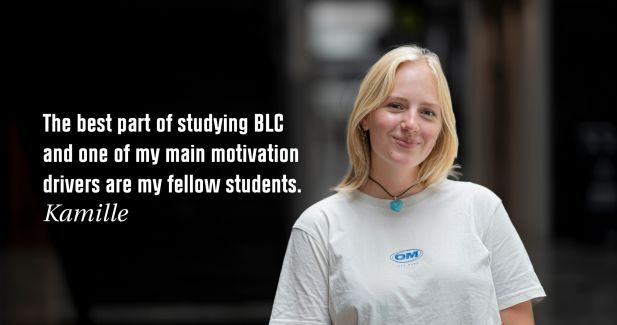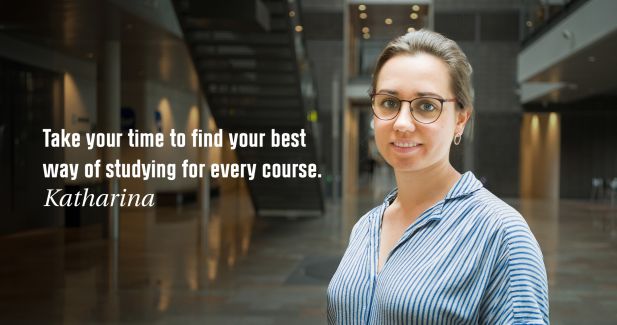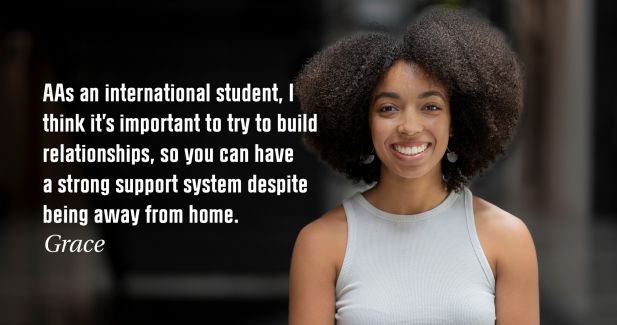BSc in Business, Language and Culture
About the programme
When business meets culture
When doing business internationally, managers and specialists not only need to be skilled in economics and business administration. They must also understand international and local cultural and business conditions. You will learn about differences and similarities between countries and cultures – and how companies and other organisations can best handle the challenges that such differences create. This could for example be when developing and implementing sustainable business solutions.
Companies need to be sensitive to the cultural context when they enter new markets – or they negotiate and work together across borders in order not to misunderstand each other. Or imagine the challenges of an international company that wants to develop a corporate identity that management and employees can relate to and understand in all its subsidiaries in many different countries. Just how does a company develop the cultural awareness that allows it to make sense of and navigate between partners, authorities and customers in Buenos Aires, Copenhagen, Munich, Seattle and Paris? Especially, when working with sustainability and social responsibility, how do companies bring people together around ideals and ideas that may clash with culturally based traditions and perceptions in some countries or markets?
Understanding international business conditions
BSc BLC will provide you with a broad understanding of business administration. You will gain insights into the fields of international business, economics, finance, statistics, strategy and accounting and learn how to identify and solve business and organisational challenges. Additionally, you will learn about sustainable business strategies in a global business context.
Language as a key to understanding culture and society
You will explore the business settings, language and culture of different countries and international arenas. All students will learn about the EU and international organisations. Additionally, you will have special courses taught in your chosen second foreign language, German, French or Spanish.
You will not have many language classes in the traditional sense. Rather, the courses with language primarily focus on knowledge of the social, historical, political and economic aspects of the countries where the language is spoken. During your fifth semester, you are expected to study at a CBS partner university in a region or country where that language is dominant.
Developing interdisciplinary business skills
Understanding business management, sustaninability, languages and culture on their own is not enough to develop a true intercultural business insight. In real life you need to combine these different skills to analyse business problems and develop effective solutions and strategies. For that reason, the BSc BLC takes an interdisciplinary and integrated approach to learning.
Many of the courses, including the first-year project and concluding bachelor project, are interdisciplinary. They combine elements and insights from traditional business topics as well as economics, and politics with an in-depth understanding of culture (your own and others’) and cultural diversity. Hence, group-based, interdisciplinary project work is the programme component that brings together the different disciplines you study including sustainability. This helps you develop practical and analytical intercultural business skills that transcend working with problems related to just the specific countries you have learnt about in your studies.
You develop a more fundamental understanding of the interrelations between business, international institutions and culture. This allows you to analyse and address the intercultural aspects and challenges of any internal or external business problem in a company or organisation.
Even if you meet the language entry requirements, we recommend that you give your language skills a serious brush-up before beginning the programme, as the language level is high.
Hear students share insights about BSc BLC
Hear students at BSc BLC share some experiences and their thoughts about the programme.
Why students chose BSc BLC
Challenges and considerations
BSc BLC has some particular challenges that are important to think about before you choose the programme. How well do these challenges correspond to the sort of person you are, how you like to work and the things you are good at?
Second foreign language
For many students in BSc BLC the biggest challenge is the second foreign language: German, French or Spanish. There are big differences in the language proficiency level of the students. Some have only worked with the language during their upper secondary while others speak it fluently. For some this can be overwhelming and lead them to feel inadequate or even struggle to understand their classes. In addition, it can be a challenge that you will not receive language instruction in the traditional sense. If for example your language is French, you will study in French about conditions in the French-speaking parts of the world, but you will not take French classes in the way you did during your upper secondary. You are expected to have the necessary foundations in your chosen language and then maintain and further develop your language skills on your own.
If you do not feel confident about your language skills it is highly recommended that you work to improve them before you begin the programme: Travel and use your language, read books and newspapers and watch movies without subtitles in your language. And after you begin the programme use your language as much as possible. You need to not compare yourself with those who are better at the language than you but rather focus on your own development and improvements.
Group work
For the two projects you will write during the BSc BLC you will work in groups – and most likely together with students from different cultures. Thus, it is useful to not only be open and willing to learn from others but also to see this as a unique opportunity to gain practical intercultural experience.
Different study techniques
Different subjects require different ways of studying. You will need to develop different study techniques for working with business and economics courses, cultural and societal courses and language studies. This takes time and you need to be comfortable with that.
Different areas of study
The many different courses within many different areas of study mean that it takes time before you fully understand how the different courses and topics relate to one another. Often it is not until the second or third year that everything comes together in your head and you get a clear picture of all the aspects of the programme’s scope. As a BSc BLC student you therefore need to be open to feeling a little confused and not yet seeing the full picture for the first semesters of the programme.
Maths as a tool
In about a third of the mandatory courses in BSc BLC you will use maths as a tool. You will not use maths that is complicated beyond the entry requirement for the programme, but you need to be comfortable having one or two courses each semester where you use maths and do calculations at a practical level.
Studying in English
If you are not used to studying in English or if you are not a native speaker, we recommend that you read more about what to consider before applying for an English-taught programme.
See Studying in English on Student Life
Hear a student guidance councellor share some challenges and considerations you should be aware of before applying to BSc BLC.
The study environment
Career options and Master's programmes
• a general understanding of how international companies operate combined
• a specific understanding of how cultural factors impact both internal and external business conditions – especially in those countries that speak your two foreign languages.
You can find more information about what you learn on the programme in the Competence profile for BLC.
Master's programme after BSc BLC
The clear majority of students from BSc BLC continue to a two-years master’s programme for a total of five years of study. It is very much the master’s rather than the bachelor programme that determines which career paths that lay open to you.
Most BSc BLC graduates tend to end up in companies or organisations with an international profile – but they work within many different fields of business and/or administration. Read more about master’s programmes and career options.
Hear a student guidance counsellor give insights to how you can create your own profile as well as share thoughts on career options and master's programmes.
Entry requirements
| English - language requirement | A |
| English - specific entry requirement | B with min. 6.0 grade average (Danish scale) |
| Mathematics | B |
| Social Studies OR International Economics OR History of Ideas OR Contemporary History | B |
| 2nd foreign language |
|
| Motivational essay | Yes - see selection quotas |
Read about entry requirements and how to apply at bachelor admission.
| Grade point average | 7,8 |
| Number of enrolled students | 118 |
| Quota 1 / Quota 2 | 70% / 30% |
| Applicants (quota 2) | 595 (466) |
| Foreign students | 47% |
| Gender distribution - men / women | 36% / 64% |
| Average age | 21,6 year |



